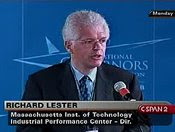 Working in the online space, rarely do I find myself printing up a document that can be read on the Web. (What is thing you call paper?) It happened this week, after seeing Richard Lester, a professor at MIT, deliver the keynote address at a National Governors Association conference in Philadelphia.
Working in the online space, rarely do I find myself printing up a document that can be read on the Web. (What is thing you call paper?) It happened this week, after seeing Richard Lester, a professor at MIT, deliver the keynote address at a National Governors Association conference in Philadelphia.Lester likes nuclear ("Nuclear power is the only carbon-free energy source that is already contributing on a large scale and that is also expandable with few inherent limits."), but it was his coining of a new metaphor (new to me, anyway) to describe the global energy challenges that made me want a hard copy of his illuminating speech.
Some are calling for a crash program by the federal government - a Manhattan Project or an Apollo Project for energy innovation.[snip]
These calls helpfully communicate the urgency and the scale of the challenge. But in another sense they are a distraction because, if we take them literally, we will end up solving the wrong problem.
In both the Apollo and Manhattan Projects there was a single, clearly-defined (though high-risk) technical goal. There was also just one customer – the federal government. Success meant achieving a single implementation of the new technology. In both cases this took just a few years to achieve. And cost was essentially no object.
Not one of these things applies to the case of energy. Here we have multiple and sometimes conflicting goals (lower prices, reduced carbon emissions, increased security). We have many different kinds of customers – from individual tenants and
homeowners to giant industrial energy users. We have multiple time-scales, from a few years to many decades. Success will come not from a single implementation but only if the technology is adopted by many firms, or by many more individuals. And finally, energy is a commodity, so cost is crucial.
In this last sense, the upcoming energy revolution is not only not like the Manhattan project, it isn't even like the digital revolution, to which it is sometimes also compared. It is actually much harder. Because energy innovations, unlike many digital technologies, usually must compete against an incumbent technology in an existing market, and this imposes tough, non- negotiable requirements on cost competitiveness, on quality, and on reliability from the very beginning.
And so, to conclude, it is long past time for serious federal leadership on energy innovation. But it is also time to move beyond the Manhattan/Apollo Project metaphor. A better metaphor might be a domestic Marshall Plan for energy innovation. The original Manhattan project involved a relatively small number of people working in secret. The original Marshall Plan took everyone, working together, to rebuild the broken European economy.Full text is available here and video of the conference can be found here. (Thank you, C-SPAN.)
Let us recapture that inspired exercise of American leadership at home. As we did once before on foreign soil, let us combine a vision of what can be with a command of hard facts and data to build an effective system for energy innovation in every one of our United States.
The Q&A after the presentation was equally interesting.
Gov. Ed Rendell (PA-D): Let me ask you, put you on the spot a little bit. If you woke up tomorrow morning and found yourself president-elect, what's the first thing you would get started on to build the type of energy infrastructure the country needs?In an exchange too long to transcribe, Gov. Jon Corzine's (NJ-D) question at 34:52 in the clip also merits attention.
Lester: Can I do two things?
Rendell: Sure. Two things. You're the president. You can do anything you want.
Lester: ...I think I would focus, first of all, on getting a program for commercializing carbon capture and sequestration that would be substantially larger, and I would hope more effective, than anything we currently have in place. The second thing I would do is to take a new look at our - and a fundamental new look - at our program for high-level waste, nuclear waste disposal. I think I would do those two things right away.
0 comments:
Post a Comment